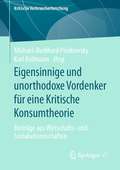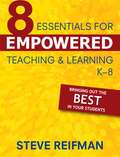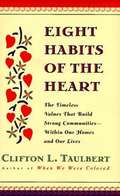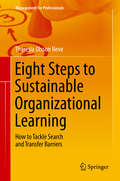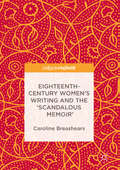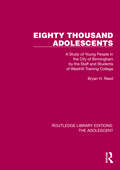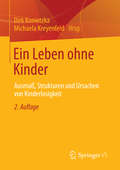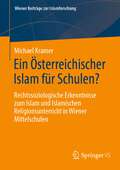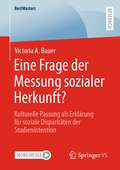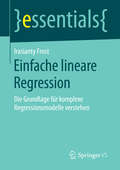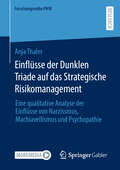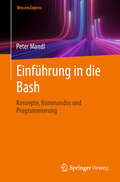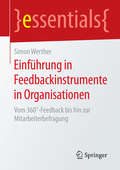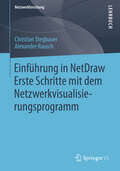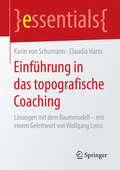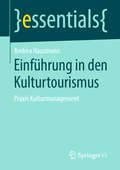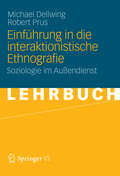- Table View
- List View
Eigensinnige und unorthodoxe Vordenker für eine Kritische Konsumtheorie: Beiträge aus Wirtschafts- und Sozialwissenschaften (Kritische Verbraucherforschung)
by Karl Kollmann Michael-Burkhard PiorkowskyDer Band bietet Beiträge über Grundlagen der aktuellen Konsumtheorie und Konsumforschung, die sich fast gänzlich aus ursprünglich unorthodoxen Ansätzen gegen die traditionelle mikro- und makroökonomische Theorie entwickelt haben. Die Anregungen kamen vor allem aus der Sozialökonomischen Verhaltensforschung und der Ökologischen Ökonomik. Aber die Rezeption ist sehr lückenhaft und die Historie ist weitgehend vergessen. Mit Bezug auf Arbeiten früherer Autoren werden neue Argumente in die aktuelle Diskussion um Entgrenzungen und Paradoxien im Konsum und der nach wie vor eng verstandenen Verbraucherrolle geboten. Es geht sowohl um Nachbesserungen in der Schärfung des Verständnisses von Konsum und Konsumenten in ihren Lebenswelten als auch um Hinweise auf die Fruchtbarkeit für die Analyse offener Fragen. Es geht um Argumente für eine paradigmatische Neuausrichtung der Verbraucherforschung und -politik. Die Beiträge thematisieren insbesondere Ambivalenzen, Optionen und Zukunftsmodi im Konsum bei der Suche nach individueller Zufriedenheit und ökologischer Nachhaltigkeit.
Eight Essentials for Empowered Teaching and Learning, K-8: Bringing Out the Best in Your Students
by Steve ReifmanInspirational and practical, this book focuses on the quality of teaching and learning in elementary and middle school classrooms and helps teachers and students find more joy, satisfaction, and meaning in their work.Experienced teacher Steve Reifman defines a quality classroom in reader-friendly terms, explains how to measure quality, and covers the conditions under which all students are empowered to reach their full potential. The author synthesizes key concepts from the fields of education, psychology, management, and personal growth to arrive at the eight essential elements of teaching, including realistic goal setting, assessment-oriented instruction, parent involvement, and teacher leadership. Written in an engaging personal voice and drawing upon the work of experts such as Stephen Covey, Howard Gardner, Ted Sizer, William Glasser, Carol Ann Tomlinson, Alfie Kohn, and Alan Blakenstein, this resourcePromotes student motivation and a classroom environment of trust and respectBuild higher-level thinking and group problem solving into the curriculumPresents classroom applications, examples, anecdotes, and reproducible pagesFeatures ideas from practicing teaching for putting these essential ideas to work in the classroomEight Essentials for Empowered Teaching and Learning, K-8 motivates student teachers, beginning teachers, and veteran educators to become the most effective instructors they can be and achieve the best learning outcomes possible for their students.
Eight Habits of the Heart: Embracing the Values That Build Strong Families and Communities
by Clifton L. TaulbertTaulbert illuminates his message that by building strong communities we build strong, responsive individuals, holding up his own life as compelling proof. Taulbert's "benefactors", the kinfolk and neighbors who supported him in his youth, had no material wealth to pass along, yet their legacy left him richer than most.
Eight Men Out: The Black Sox and the 1919 World Series
by Eliot AsinofA “vividly, excitingly written” classic of baseball history: “The most thorough investigation of the Black Sox scandal on record” (Chicago Tribune).It was “the most gigantic sporting swindle in the history of America”—the 1919 fix of the World Series and attempted cover-up. Eliot Asinof has reconstructed the entire scene-by-scene story of the fantastic scandal in which eight Chicago White Sox players arranged with the nation’s leading gamblers to throw the Series in Cincinnati. Mr. Asinof vividly describes the tense meetings, the hitches in the conniving, the actual plays in which the Series was thrown, the Grand Jury indictment, and the famous 1921 trial. Moving behind the scenes, he perceptively examines the motives and backgrounds of the players and the conditions that made the improbable fix all too possible.Here, too, is a graphic picture of the American underworld that managed the fix, the deeply shocked newspapermen who uncovered the story, and the war-exhausted nation that turned with relief and pride to the Series, only to be rocked by the scandal. Far more than a superbly told baseball story, this is a compelling slice of American history in the aftermath of World War I and at the cusp of the Roaring Twenties.“Dramatic detail . . . an admirable journalistic feat.” —The New York Times“As thrilling as a cops and robbers tome.” —The Boston Globe
Eight Steps to Sustainable Organizational Learning
by Theresia Olsson NeveThis book describes the journey of developing and implementing a global knowledge sharing strategy at the multinational project development and construction company Skanska. The strategy described is based on a "people-to-people" approach and covers four different strategic business units with more than 50,000 employees. It shows how the introduction of knowledge management has led to improved collaboration on customers and increased sales, as well as quality improvements and higher employee satisfaction. The book introduces a 8-step framework for achieving sustainable organizational learning and provides a theoretical introduction to the field of knowledge management and cognitive pedagogy.
Eighteenth-Century Literary Affections (Palgrave Studies in Affect Theory and Literary Criticism)
by Louise JoyThis book assesses the mediating role played by 'affections' in eighteenth-century contestations about reason and passion, questioning their availability and desirability outside textual form. It examines the formulation and idealization of this affective category in works by Isaac Watts, Lord Shaftesbury, Mary Hays, William Godwin, Helen Maria Williams, and William Wordsworth. Part I outlines how affections are invested with utopian potential in theology, moral philosophy, and criticism, re-imagining what it might mean to know emotion. Part II considers attempts of writers at the end of the period to draw affections into literature as a means of negotiating a middle way between realism and idealism, expressivism and didacticism, particularity and abstraction, subjectivity and objectivity, femininity and masculinity, radicalism and conservatism, and the foreign and the domestic.
Eighteenth-Century Women's Writing and the 'Scandalous Memoir'
by Caroline BreashearsThis book contributes to the literary history of eighteenth-century women's life writings, particularly those labeled "scandalous memoirs. " It examines how the evolution of this subgenre was shaped partially by several innovative memoirs that have received only modest critical attention. Breashears argues that Madame de La Touche's Apologie and her friend Lady Vane's Memoirs contributed to the crystallization of this sub-genre at mid-century, and that Lady Vane's collaboration with Tobias Smollett in The Adventures of Peregrine Pickle resulted in a brilliant experiment in the relationship between gender and genre. It demonstrates that the Memoirs of Catherine Jemmat incorporated influential new strategies for self-justification in response to changing kinship priorities, and that Margaret Coghlan's Memoirs introduced revolutionary themes that created a hybrid: the political scandalous memoir. This book will therefore appeal to scholars interested in life writing, women's history, genre theory, and eighteenth-century British literature.
Eighty Thousand Adolescents: A Study of Young People in the City of Birmingham by the Staff and Students of Westhill Training College (Routledge Library Editions: The Adolescent)
by Bryan H. ReedEighty Thousand Adolescents, originally published in 1950, illustrated by maps, photographs and diagrams, describes and interprets the results of a study of the young people of Birmingham. This study was made by the staff and students of Westhill Training College, under the direction of Bryan Reed, Youth Tutor. Visits were paid to some hundreds of youth organizations, and answers to a series of questions were given by over a thousand young people, both ‘attached’ and ‘unattached’. <p><p> Some of the questions to which the investigators set out to find answers were: In what kind of homes are young people growing up? How do they earn their living? How many take advantage of opportunities for further education? How do they spend their leisure? – and their pocket money? What do they read? What are their emotional, intellectual, spiritual and social needs? and how far do Education Authorities, Clubs, Churches, etc. meets these needs? <p><p> In his summing-up Mr. Reed calls attention to the need for imaginative and instructed leadership, for a sense of purpose in the Youth Service, and for the integration of this Service in the wider life of the community. Today it is a fascinating look back at adolescent life in post-war Britain.
Ein Leben ohne Kinder
by Dirk Konietzka Michaela KreyenfeldTrotz der offensichtlichen sozialpolitischen Relevanz und großen medialen Aufmerksamkeit des Phänomens Kinderlosigkeit sind das Ausmaß, die Ursachen und die Konsequenzen der Kinderlosigkeit in Deutschland bislang unzureichend untersucht worden, mit der Folge, dass in öffentlichen Debatten eine unkritische Verwendung irreführender, wenn nicht falscher Angaben über Kinderlosigkeit vorherrscht. Das Ziel des Bandes besteht vor diesem Hintergrund darin, das Phänomen der Kinderlosigkeit in Deutschland analytisch differenziert zu durchdringen und belastbare Daten und Ergebnisse über das Ausmaß und die Struktur, die Ursachen und Folgen von Kinderlosigkeit zu präsentieren.
Ein guter Chef sein: Ratgeber für erfolgreiche Führung
by Clemens HaslerSofern Sie sich für Führung im privaten, ehrenamtlichen oder beruflichen Umfeld interessieren, ist dieser Ratgeber genau richtig für Sie. Auch wenn Sie Ihr eigenes Führungsverhalten reflektieren möchten oder vor kurzem die Funktion als Vorgesetzter bzw. Chef übernommen haben, finden Sie in diesem Buch viele konkrete Beispiele und hilfreiche Tipps zur Umsetzung. So lernen Sie, optimal zuzuhören und Fragen zu stellen, um Bedürfnissen von Mitarbeitenden und anderer besser gerecht werden zu können und gemeinsam die gesteckten Ziele zu erreichen.Dieses Buch hilft allen, die erfahren möchten:welche Werte für die Führung von Menschen von Bedeutung sind und wie man diese im Alltag erkenntwarum es in vielen Bereichen wichtig es ist, selbst als Vorbild voranzugehenwie wichtig Ziele im partizipativen Führungsstil sindwie Menschen in Verantwortung nachhaltig zur Zufriedenheit mit diversen Stakeholdern, inkl. Mitarbeitenden und Aufsichtsrat, zusammenarbeitenZielgruppen: Alle Menschen und Führungskräfte, die in irgendeiner Weise führen und ihr Tun reflektieren möchten Neu ernannte Führungskräfte und alle, die gerne in einer Vorgesetzten-Funktion tätig wären und wissen möchten, was sie erwarten könnte Zum Autor: Der Autor Clemens Hasler hat schon immer mit Leidenschaft geführt, sei es in Vereinen, Abteilungen oder Unternehmen als CEO. Er nimmt Sie als Leser mit und lässt sich in diesem Ratgeber über die Schultern schauen.
Ein Österreichischer Islam für Schulen?: Rechtssoziologische Erkenntnisse zum Islam und Islamischen Religionsunterricht in Wiener Mittelschulen (Wiener Beiträge zur Islamforschung)
by Michael KramerDiese Publikation handelt von der Beziehung zwischen dem Staat und dem Islam im allgemein-politischen und im schulischen Kontext, wobei der Islam neben anderen islamischen Institutionen in erster Linie von der Islamischen Glaubensgemeinschaft in Österreich (IGGÖ) vertreten wird. Der IGGÖ – ebenso wie anderen Kirchen und Religionsgesellschaften (KuR) – werden im österreichischen Religionsrechtssystem weitreichende Autonomierechte eingeräumt, vor allem in der Schule in Form eines konfessionellen Religionsunterrichts (RU). Zur Erforschung dieser Beziehung in der Schule wird ein rechts- und politikwissenschaftlicher Blick auf die rechtlichen Rahmenbedingungen und die soziale Wirklichkeit des Islams und des RU der IGGÖ (IRU) in Wiener Mittelschulen geworfen. Konsequenterweise wird auch auf die verschiedenen involvierten Akteur*innen geblickt, insb. auf muslimische Schüler*innen und Eltern, Religionslehrer*innen, Fachinspektor*innen und sonstige Autoritäten der IGGÖ sowie Schuldirektor*innen, Bildungsdirektionen und das Bildungsministerium. Dafür wurden im Rahmen einer qualitativen Sozialforschung sieben (Schul-)Autoritäten der IGGÖ (IGGÖ-SA) als ‚Vertreter*innen des Islams‘ und sechs Wiener Mittelschuldirektor*innen (MSD) als ‚staatliche Vertreter*innen‘ interviewt. Die Interviews verfolgten drei Zwecke: 1) die Ergründung negativer rechtlicher, politischer, gesellschaftlicher und religionsgesellschaftlicher Einflussfaktoren auf die allgemeine Beziehung zwischen dem Staat und dem Islam bzw. der IGGÖ (und den Muslim*innen); 2) die Erhebung von Herausforderungen, Spannungen und Konflikten sowie Idealvorstellungen in der schulpolitischen, -bürokratischen, -organisatorischen, individuellen und korporativen Beziehungsdimension, sowie 3) die Erforschung von persönlichen Einstellungen und Haltungen von IGGÖ-SA und MSD zum Islam und dem IRU in der Schule sowie – vonseiten der IGGÖ-SA – zum Staat und der Gesellschaft. Während der dritte Zweck in dieser Publikation nur eine untergeordnete Rolle einnimmt, liegt das Hauptaugenmerk auf den abstrahierten Spannungsfeldern des 'gelebten Rechts' im Sinne der sozialen Wirklichkeit in den entsprechenden Beziehungsdimensionen, die in einer rechtssoziologischen Analyse dem normativem Recht gegenübergestellt und entlang idealtypischer Einstellungen und Haltungen auf Ursachen, Wirkungen und Lösungen untersucht werden. Die Analysethemen umfassen mitunter die Einbeziehung von Fachinspektor*innen für Religion in die Bildungsdirektionen, den Streit über die Abkürzung der IGGÖ für die Eintragung in Zeugnisse, die Schwierigkeiten in der Organisation mit dem RU, das (religiöse) Verhalten muslimischer Schüler*innen und Eltern in der Schule sowie die Grenzen der Lehre im IRU im Rahmen der staatsbürgerlichen Erziehung. Diesbezügliche Idealvorstellungen zu den Herausforderungen ermöglichen abschließend aus einer sozialintegrativen und pluralistischer Perspektive der IGGÖ-SA die Konturierung eines Österreichischen Islams bzw. eines idealtypischen IRU.
Eine Frage der Messung sozialer Herkunft?: Kulturelle Passung als Erklärung für soziale Disparitäten der Studienintention (BestMasters)
by Victoria A. BauerTrotz zahlreicher Hinweise darauf, dass verschiedene Messarten sozialer Herkunft zu Unterschieden bei der Erfassung herkunftsspezifischer Disparitäten der Bildungsbeteiligung führen, werden soziale Ungleichheiten in der Bildungsforschung überwiegend eindimensional gemessen. Der tatsächliche Umfang von Bildungsungleichheiten bleibt dabei unerforscht sowie auch deren Erklärung. Besonders betroffen ist die Untersuchung von Prozessen kultureller Reproduktion nach Bourdieu, welche bei der Übersetzung in quantitative Konstrukte auf beinahe wahllos herangezogene Einzelaspekte reduziert werden. Folglich bleibt ungeklärt, wann kulturelles Kapital als angemessener Indikator für das Zustandekommen von sozialen Ungleichheiten im Bildungssystem heranzuziehen ist. Dieses Buch widmet sich der Frage, wie die Konzeptualisierung sozialer Herkunft den Einfluss kulturellen Kapitals auf soziale Disparitäten der Studienintention verändert. Es zeigt sich, dass unterschiedliche Maße der sozialen Herkunft zu Unterschieden bei der Erklärung sozialer Ungleichheiten am Hochschulzugang durch kulturelles Kapital führen. Verschiedene Formen des Kulturkapitals können sowohl als Indikator wie auch als Erklärung für soziale Ungleichheiten dienen.
Einfache Datenauswertung mit R: Eine Einführung in uni- und bivariate Statistik sowie Datendarstellung mit RStudio und R Markdown
by Volker Gehrau Katharina Maubach Sam FujarskiWas, wenn ich wissenschaftliche Fragestellungen und Daten habe, aber nicht weiß, wie ich diese angemessen auswerten kann? Und wie verfahre ich, wenn ich Ergebnisse vorliegen habe, aber nicht weiß, wie ich diese interpretieren und berichten muss? Bei solchen Problemen der Datenauswertung setzt dieses Buch an und erklärt sowohl die theoretischen Grundlagen als auch deren statistische Umsetzung, die Datenvisualisierung und das Berichten der Ergebnisse.In den einzelnen Kapiteln wird die uni- und bivariate Datenanalyse mit der kostenlosen open source Software RStudio umfassend erläutert und an einem Beispieldatensatz eingeübt. Um den Einstieg in R und R Markdown zu erleichtern, werden neben Beispieldateien (die sog. Beispielskripte) zusätzlich individuell anpassbare Musterskripte als Dateien online zur Verfügung gestellt. Die statistischen Verfahren umfassen Häufigkeiten, Verteilungen, Kreuztabellen, Korrelationen und Mittelwertvergleiche. Des Weiteren werden die nötigen Grundkenntnisse in RStudio und R Markdown sowie die Grundlagen des Datenmanagements, der Datenvisualisierung und des automatisierten Erstellens von Forschungsberichten vermittelt.Die AutorenDr. Volker Gehrau ist Professor für Kommunikationswissenschaft am Institut für Kommunikationswissenschaft der Universität Münster.Katharina Maubach (M.A.) ist wissenschaftliche Mitarbeiterin am Institut für Kommunikationswissenschaft der Universität Münster.Sam Fujarski (M.Sc.) ist wissenschaftliche Mitarbeiterin am Institut für Kommunikationswissenschaft der Universität Münster.
Einfache lineare Regression: Die Grundlage für komplexe Regressionsmodelle verstehen (essentials)
by Irasianty FrostDieses essential befasst sich mit der einfachen linearen Regression, der simpelsten Form von Regressionsmodellen, in der f#65533;r die Modellbildung nur eine einzige Einflussvariable ber#65533;cksichtigt wird. Leser finden in diesem Buch die Methode der kleinsten Quadrate zur Sch#65533;tzung der Modellparameter, Residualanalysen zur #65533;berpr#65533;fung der Modellannahmen sowie weitere statistische Verfahren zur Beurteilung des Modells. Zudem erfahren sie, wie das Modell als ein Prognoseinstrument eingesetzt werden kann. Somit erwerben Leser eine solide Grundlage zum Verst#65533;ndnis komplexer Regressionsans#65533;tze, bei denen mehrere Variablen die Zielgr#65533;#65533;e beeinflussen und nichtlineare Zusammenh#65533;nge vorliegen.
Einfluss von Führung auf die Kundenzufriedenheit und die Budgeteinhaltung in vollstationären Pflegeeinrichtungen: Eine empirische Untersuchung
by Stephanie KirschDie vorliegende Erhebung untersucht den Einfluss von Führung auf die Kundenzufriedenheit und die Budgeteinhaltung in stationären Pflegeeinrichtungen. Dabei werden ausgewählte Einflussfaktoren wie z. B. die werteorientierte Kommunikation, die Berücksichtigung von Qualitätsmanagementsystemen sowie die Durchführung von Abweichungsanalysen u. a. in ihrer konkreten Wirkmacht analysiert und eruiert.Die Arbeit leistet einen Beitrag zur Managementforschung und somit für Diskurse über die Versorgungs- und Lebensqualität der Bewohner sowie über die Arbeitszufriedenheit in der vollstationären Pflege und über die Bedeutung von Führung in einem stark regulierten ‚Quasi-Markt‘ der vollstationären Pflege innerhalb des Dienstleistungssektors.Das Senioren-Zuhause der Zukunft erfordert wesentliche architektonische und konzeptionelle Veränderungen sowie eine vielfältige Angebotskultur inkl. einer Quartiersöffnung.Die ermutigende Botschaft besteht in einer Bestätigung der positiven Wirkung des Konzeptes der Interaktionsarbeit mittels einer auf Werten basierenden Kommunikation und Interaktion in sozialen Gefügen.
Einflussnahme auf das Soziale: Realisierung von subjektiver Lebensqualität (Forschung, Innovation und Soziale Arbeit)
by Bringfriede Scheu Otger AutrataBringfriede Scheu und Otger Autrata untersuchen in diesem Band die Voraussetzungen und Möglichkeiten von Einflussnahme im Kontext des Sozialen. Einflussnahme ist nicht immer und zwangsläufig sozial, sie kann sich aber auch auf das Soziale beziehen. Wenn Einflussnahme im Sozialen stattfindet, sind die Spezifika des Sozialen rahmend für die Einflussnahme. Die Veröffentlichung beschäftigt sich damit, wie Einflussnahme auf das Soziale zum Erhalt und zur Förderung von subjektiver Lebensqualität beitragen kann, wobei der Fokus hier auf Widerspiegelungsprozessen liegt.
Einflüsse der Dunklen Triade auf das Strategische Risikomanagement: Eine qualitative Analyse der Einflüsse von Narzissmus, Machiavellismus und Psychopathie (Forschungsreihe PHW)
by Anja ThalerInnerhalb dieses literaturbasierten Forschungsprojektes werden Einflüsse zum einen durch die Dunkle Triade und zum anderen aus dem strategischen Risikomanagement untersucht. Im Bereich der Dunklen Triade werden mithilfe des Five Factor Modells gemeinsame als auch unterschiedliche Einflüsse sowie Tendenzen von Narzissmus, Machiavellismus sowie Psychopathie ermittelt. Im Kontext des strategischen Risikomanagements werden Einflüsse organisatorischer und kultureller sowie kognitiver und emotionaler Aspekte analysiert. Während kognitive und emotionale Einflüsse eine direkte Einflussnahme auf das strategische Risikomanagement implizieren, sind demografische Einflüsse im Vergleich weniger aussagekräftig. Organisatorische Einflüsse können eine moderierende Rolle spielen und das Verhalten von Managern entsprechend verstärkend oder abschwächend gestalten, abhängig von den Rahmenbedingungen innerhalb der Unternehmung.
Einführung in die Bash: Konzepte, Kommandos und Programmierung
by Peter MandlDas Buch vermittelt praktisch verwertbare Shell-Kenntnisse mit einem Fokus auf Bash unter Linux. Neben den grundlegenden Konzepten werden die wichtigsten Bash-Kommandos für die Dateibearbeitung, die Vergabe von Rechten und die Prozessverwaltung knapp und prägnant erläutert. Die Kommandos werden mit vielen Übungen praktisch erprobt. Erste Shell-Programme können nach kurzer Zeit eigenständig entwickelt werden. Die Produktfamilie WissensExpress bietet Ihnen Lehr- und Lernbücher in kompakter Form. Die Bücher liefern schnell und verständlich fundiertes Wissen.
Einführung in Feedbackinstrumente in Organisationen: Vom 360°-Feedback bis hin zur Mitarbeiterbefragung (essentials)
by Simon WertherFeedback ist eines der zentralen psychologischen Mechanismen, um Motivation, Zufriedenheit und damit letztlich auch die Leistung von Mitarbeitern mittel- bis langfristig positiv zu beeinflussen. In diesem Essential werden unterschiedliche Feedbackinstrumente in Organisationen vorgestellt. Dabei reicht das Spektrum von Führungskräftefeedback und 360°-Feedback auf der Ebene der Personalentwicklung über Teamfeedback und Teamdiagnose auf der Ebene der Teamentwicklung bis hin zu Change Monitoring, Pulsbefragungen und Mitarbeiterbefragungen auf der Ebene der Organisationsentwicklung. Außerdem werden Zukunftsszenarien vorgestellt, um den veränderten Erwartungen der Mitarbeiter entgegenzukommen.
Einführung in NetDraw: Erste Schritte mit dem Netzwerkvisualisierungsprogramm (Netzwerkforschung)
by Christian Stegbauer Alexander RauschDer Band führt anschaulich in das Programm „NetDraw“ Schritt für Schritt ein und ermöglicht den LeserInnen die Nutzung des Programms innerhalb weniger Stunden.
Einführung in das Psychodrama: Für Psychotherapeuten, Berater, Pädagogen, soziale Berufe (essentials)
by Falko Ameln Josef KramerDieses Einführungswerk fasst die Grundlagen des Psychodramas in kompakter Form zusammen. Dazu gehören die wichtigsten theoretischen Konzepte (Rollentheorie, Spontaneität und Kreativität, Soziometrie, surplus reality), die Phasen psychodramatischer Arbeit sowie psychodramatische Arrangements und Techniken (Aufstellungen, Rollentausch, Doppel, Spiegel u. a. ). Beispiele zeigen die praktische Nutzung des Psychodramas in verschiedenen Anwendungsfeldern (Psychotherapie, Supervision, Coaching, Organisationsentwicklung, Schule, soziale Arbeit) und Kombinationsmöglichkeiten mit anderen Verfahren wie Psychoanalyse, Verhaltenstherapie oder systemischer Beratung.
Einführung in das topografische Coaching: Lösungen mit dem Raummodell – mit einem Geleitwort von Wolfgang Looss (essentials)
by Karin Von Schumann Claudia HarssKarin von Schumann und Claudia Harss zeigen in diesem essentiaI, wie Lösungen im Coaching – und auch im Leben – zustande kommen und welche typischen Stationen Klienten bis dorthin durchlaufen. Die Autorinnen beschreiben diese Stationen in ihrer Gesamtheit als „Landkarte“, das topografische Coaching. Mit Hilfe des Raummodells des topografischen Coachings lassen sich die folgenden Fragen präzise und klar beantworten: Wo steht mein Klient? Welche nächsten Schritte stehen für ihn an? Welcher Coachingfokus ist bei meinem Klienten zu wählen? Insbesondere für den Klienten wirkt das Raummodell unmittelbar entlastend: Er erkennt, dass er sich in einer typischen Entwicklungsphase befindet, sein Zustand bzw. seine Situation „ganz normal“ sind.
Einführung in den Kulturtourismus: Praxis Kulturmanagement (essentials)
by Andrea HausmannAndrea Hausmann behandelt kompakt, fundiert und praxisnah die im Kulturtourismus wichtigsten Begriffe, Merkmale, Akteure und Entwicklungen. Dabei beleuchtet sie zum einen die wichtigsten Leistungsträger auf der Angebotsseite und arbeitet ihre jeweiligen Besonderheiten bzw. spezifischen Interessen heraus. Zum anderen stellt die Autorin mögliche Typologien der kulturtouristischen Nachfrage vor und erläutert die Bedeutung der Customer Journey als Instrument zur Verbesserung des Qualitätserlebnisses im Kulturtourismus.Die Autorin:Prof. Dr. Andrea Hausmann ist Professorin am Institut für Kulturmanagement der Pädagogischen Hochschule Ludwigsburg und berät Kulturbetriebe in den Themen Tourismus, Marketing und Personal.
Einführung in die Arbeits- und Organisationspsychologie (Basiswissen Psychologie)
by Bernd MarcusDie Arbeits- und Organisationspsychologie beschäftigt sich mit der Gewinnung und Anwendung psychologischer Erkenntnisse in der Arbeitswelt. Ihre Themenfelder lassen sich den Bereichen Arbeit (z.B. Arbeitsanalyse und -gestaltung, Belastung und Beanspruchung), Personal (z.B. Personalauswahl, -entwicklung und -beurteilung) und Organisation (z.B. Arbeitsmotivation und -zufriedenheit, Führung, Arbeitsgruppen, Organisationsentwicklung) zuordnen. Das Buch führt in verständlicher Sprache in das Fach und seine Teilgebiete ein und bietet so Orientierung und Überblick. Eine Begleitwebsite bietet Lernmaterialen für Studierende und Foliensätze für Lehrende.
Einführung in die Interaktionistische Ethnografie
by Michael Dellwing Robert PrusEthnografie hat weiterhin den Geruch von Abenteuer. Der vorliegende Band bietet eine Heranführung an die ethnografische Haltung und Praxis, mit der das immersive Abenteuer der Feldarbeit und das akademische Abenteuer der Schreibarbeit zusammen bestritten werden können. Als von Interaktionisten verfasste Einführung bietet er Einsteigern eine klassische, zurück zu den Chicagoer Wurzeln führende Praxis an, in der Intersubjektivität, Offenheit, Unwägbarkeit, Aufs-Feld-Einlassen und kreative Neuschöpfung aus dem Feld heraus betont werden. Dabei ist er theoretisch fundiert und feldpraktisch ausführlich gehalten: Mit reichhaltigen Beispielen zeigt er auf, wie die Sammlung von Material, die begleitende Analyse und das schlussendliche Verfassen eines analytisch gebundenen Feldberichts organisiert werden können. Zugleich aber steht er in der interaktionistischen Tradition, die "Realität des Feldes" als primäre Realität zu sehen, die nicht durch extern angelegte Theorie oder Methode planiert werden darf. Damit ist es eine Einleitung in eine kreative, pluralistische und bescheidene ethnografische Haltung.
